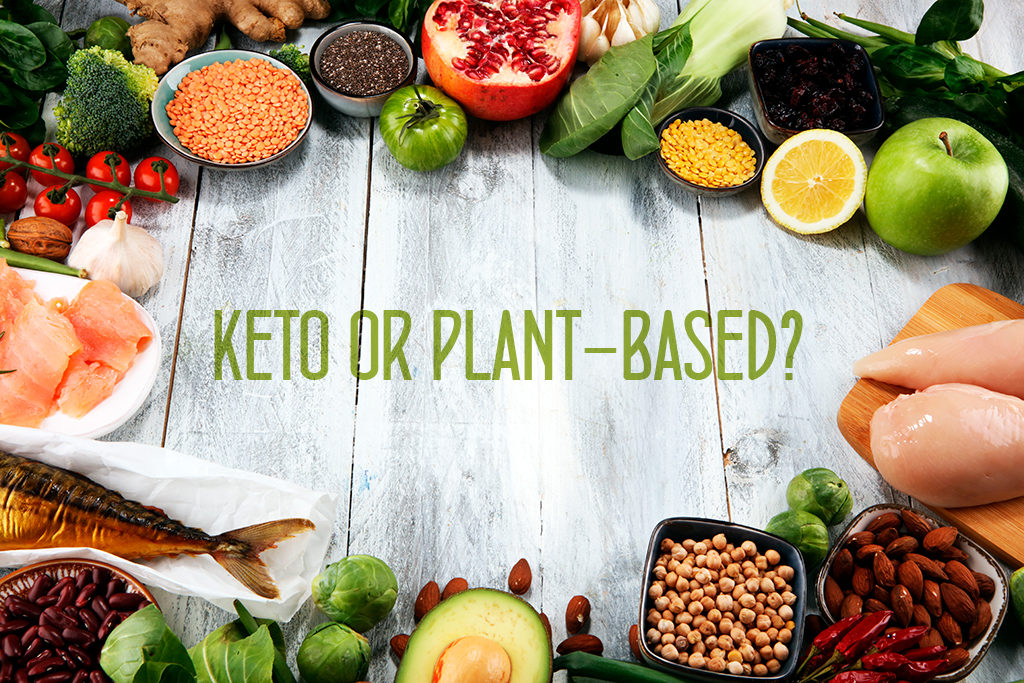

Keto or Plant-based: which is the Best Diet for Cancer?
Every year around this time, many of us are already starting to give up on their New Year’s resolutions as yet another fad diet fails to deliver. These days, the ketogenic diet is one of the biggest diet trends. The popularity of the ketogenic diet (also known as keto) has surpassed even Atkins. The premise is largely the same–high protein and animal fat content and low carbohydrate content. The goal is to force the body into a ketogenic state where it goes straight into fat-burning and weight loss mode. For those who are trying to drop a few pounds, it sounds perfect. But what about for those who are looking for a diet to fight or prevent cancer? What type of diet is best suited for taking on the C-word–keto or plant-based?
Keto: What is it?
A true ketogenic diet keeps your body in ketosis constantly and requires regular daily measurement of your ketone levels. With that being said, most people who are on a keto diet are really on a low carbohydrate diet. It is comprised of around 75% fat, protein, and very little to no carbohydrates.
Does Keto Reduce the Risk of Cancer?
Keto in and of itself doesn’t necessarily reduce the risk of cancer. If it is used as a successful weight loss plan, it can have the added benefit of reducing cancer risk due to weight loss. Why? Obesity and being overweight is a major contributing factor to developing some type of cancer.
However, simply because it can be an effective way of losing weight for some people does not necessarily make it an effective anti-cancer diet. For example, we know that smoking can help a person lose weight. We also know there are bigger health hazards associated with smoking. Simply because keto can help a person lose weight, doesn’t necessarily mean it’s a healthy diet.
Ultimately, the amount of fat content and red meat that are part of a typical keto diet could potentially cause cancer. Additionally, certain cancer treatments make it hard for the body to break down the proteins. An article published by the University of Texas Cancer Center goes into detail about the potential links to cancer and other potential health problems associated with the ketogenic diet.
The Case Against Keto
In recent years, there has been a lot of backlash on diets such as Atkins and the Zone. These high protein and low carb diets that called for eliminating an entire dietary group in favor of animal fat and animal protein may have helped people lose weight. However, they had the unintended consequence of causing other health issues. A 2012 study showed that high fat and protein, low carb diets have the potential to increase the risk of heart disease by almost 30%.
Additionally, adding a substantial amount of animal fat has also been shown to increase the risk of certain types of cancer. Among them, colorectal cancer and breast cancer. Additionally, many studies have shown a significantly increased risk of colon cancer associated with diets high in animal fats.
The Ketogenic Diet Alternative
Although keto is the latest diet craze to take the world by storm, there is actually a better, healthier diet for preventing cancer. A plant-based, low fat, balanced diet is not only proven to be a more effective diet in terms of weight loss, it has several added benefits. First, it is sustainable over the long term. Healthy lifestyle choices including a low-fat balanced diet are able to be maintained throughout a lifetime. Second, it is a balanced approach toward a healthy lifestyle. A study published in the Nursing Times indicates that while a low carb, high fat diet can be effective at weight loss, over time there are significant risks associated with following a diet like keto. Among them, bone loss, muscle wasting, kidney disease, kidney stones, and in severe cases multiple organ failure. Carbs are necessary for the body.
Low-fat, plant-based diets loaded with superfoods have numerous benefits. Not only are they more versatile (no food groups are being eliminated), but they are easily modified to suit almost any need or lifestyle. A comprehensive 2004 study shows the importance of nutrition in cancer prevention. The study indicates that 30-40% of cancers can be prevented by dietary measures and lifestyle alone. To take it a step further, it emphasizes the importance of a wide range of healthy, whole, natural foods rich in antioxidants.
The plant-based diet also has the added benefit of being a more successful diet for weight loss than the keto diet. It seems hard to believe this is the case when so many people are singing the praises of the keto diet. The reason why it seems people are more successful with keto than a low-fat plant-based diet is it seems to offer more appealing types of foods. Keto food recipes are even titled things like “fat bombs”. They consist of buttery, creamy, and fatty foods. For people who may struggle with food, this type of diet can be very appealing.
Ultimately, weight loss happens when our bodies burn more calories than we consume. Certain foods help give us more energy and leave us feeling more satisfied than others. But when the calories we consume are fewer than those calories that we burn, then we lose weight. Keto may certainly help people lose weight, which may help lower a person’s cancer risk in some ways. But the keto diet is not a good long-term solution. In fact, over time it has the potential of causing more health problems including heart disease and certain types of cancer. Instead, a low-fat plant-based diet rich in superfoods is a delicious, healthy, and sustainable way of living.
Final Thoughts
As for me, I prefer to follow a plant-based diet, this path has resonated with me ever since I started my healing journey. It is not my intent to condemn one diet over another, however, based on my research and personal experience, a plant-based diet seems to be the way to go especially when dealing with cancer.
6 Comments
Leave a Comment

hey there
I'm Karen!
I have found my cancer journey to be a positive and profound transformational experience. I’m inspired to share my healing journey here, and trust you’ll find hope, encouragement and purpose as you discover the healing power that lies within you.
Join
The Mailing List!
By signing up for my newsletter, you agree with our Privacy Policy and Terms & Conditions.



Can you tell me if using an inferred sauna is best to kill cancer cells if so, what temp, how many minutes & how many times a week for it to work & kill cancer cells
A plant-based and ketogenic diet aren’t mutually exclusive. I’ve been following a plant-based keto diet since my diagnosis with stage 4 lung cancer spread to the brain. One year later I’m in complete remission. While I personally make the choice to incorporate once a week wild-caught salmon or pasture raised egg, this isn’t necessary to remain in a state of cancer-killing ketosis.
The evidence is mounting that ketosis can benefit most cancers: https://cancerv.me/2019/10/11/keto-for-cancer-benefits-and-downsides/
As recently as September 2019 a human trial showed 100% survival of 30 women with late stage breast-cancer treated with chemo+keto vs only 60% survival for the 30 treated with only chemo. https://www.ncbi.nlm.nih.gov/pubmed/31496287/
Most important of all, in my opinion, is to eat real food rich in nutrition and avod packaged, processed food that has become synonymous with the Western diet.
Maggie Jones,
I am currently following a plant based/vegan diet with no meat, dairy or fish. You mentioned in your post that you incorporate farm raised eggs and fish once a week. What is the serving size? 1 egg/ 1x a week and 1oz of lean fish, salmon for you. I never ate eggs but I prefer egg whites with spinach and peppers, and still can’t cook salmon properly so I prefer wild caught scallops. Do you consume any organic chicken other than fish? Do you take supplements
Good answer Maggie. I tend towards plant based more than keto , but now read that the fruits and beans I eat convert to sugars. The keto , avoiding this , increases risk of heart disease. Think I’ll sit in a field and eat grass ( along with good quality plain chocolate which most diets seem to allow !) Gerson also avoided nuts and avocados . Hey Ho.
What about comparing women who do chemo-+plant based and chemo+keto? Otherwise it is not a true comparison. Any info on this would be much appreciated.
Thank you, Karen, it is refreshing and very helpful to read a non-hype clearly researched and analysed view. Although I was vegetarian for ten years some time ago I now eat fish regularly (not organic, of course) and occasional organic chicken, sausages and/or bacon. However, somewhere inside I have always been suspicious of the ketogenic diet. Perhaps another input would be relevant at this point for those who argue strongly for it: there is a book entitled ‘Metabolic Typing’ by William Wolcott in fact, there are any number of articles about this in which it is pointed out that mankind has several distinct dietary histories. This takes two forms.
1) In Africa, the Western A Price Foundation examined three different dietary types which produced ascending health in the following order: c) Agrarian; B) Hunter-gatherer; A) Maritime – this being the healthiest!
2) A) That the African hunter-gatherer essentially survives on a 30-40% lean meat diet with the rest as plant-based; B) The European big-game hunter survived on mostly meat with only seasonal vegetables. C) The agrarian came much later but the first two have formed specific inclinations in people who have one or the other more striongly in their genes. As a rule of thumb, the taller types are nearer to African hunter-gatherer (being tall allows for greater dissipation of heat). The stockier frame is related more to colder climates (conserving heat). This may be the root of the constant disagreements which go on about the efficacy of one or the other!